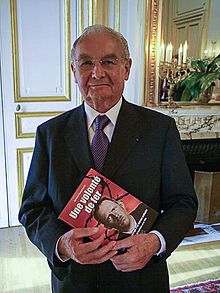Robert Hébras
This article includes a list of references, related reading or external links, but its sources remain unclear because it lacks inline citations. (February 2010) |

Robert Hébras (born 29 June 1925 in Oradour-sur-Glane) is one of only six people to survive the massacre of Oradour by Nazi Germany's Waffen-SS Das Reich Panzer Division on 10 June 1944.
Biography[]
Robert Hébras, Jean-Marcel Darthout, Mathieu Borie, Clément Broussaudier, Yvon Roby and Pierre-Henri Poutaraud were the only six of 186 male civilians who survived the initial execution with machine guns. These six stayed in the barn, partly covered beneath the dead bodies of their friends, and pretended to be dead. The SS soldiers went on the pile of corpses and shot everyone who was still moving. They set the barn on fire 15 minutes after the execution to cover up the massacre. Poutaraud fled out of the fire too soon and was murdered by a guard positioned near the cemetery.[citation needed]
Fearing for their lives, the five remaining men hid under burning corpses long enough that they themselves caught fire. Hébras said "My left arm and my hair had already burned. It was a terrible pain; therefore I had to get out of the barn.”[citation needed] Three of five men who escaped out of the burning village were seriously injured by the hail of bullets, including Hébras. One bullet remained stuck in his leg, another touched his wrist.
Hébras's mother Marie, nine-year-old sister Denise, and 22-year-old sister Georgette died in the massacre. His father only survived by chance as he happened to be at a farm outside Oradour, as did his sister Leni, who had married and moved away.[citation needed]
After the massacre, Hébras participated actively in the resistance against Nazism; in the last year of the war he also fought for the French Resistance. In 1983, he took part in the lawsuit against Heinz Barth, one of the assassins of Oradour, as a witness in the former East Germany. In 2003 a documentary movie was published, titled Encounter with Robert Hébras - On the trail of extinguished life (“Begegnung mit Robert Hébras - Auf den Spuren ausgelöschten Lebens") by German filmmaker Bodo Kaiser.

Hébras is married, has a son and three grandchildren, and lives in Saint-Junien near Oradour. He still takes tours through the ruins of the village.[citation needed] In March 2008, he was awarded the Austrian Holocaust Memorial Award by the Austrian Holocaust Memorial Service at the Austrian embassy in Paris.[citation needed]
References[]
- Hébras, Robert (1992). Oradour-Sur-Glane, Le drame heure par heure [Oradour-Sur-Glane, The drama hour by hour] (in French). Editions C.M.D. ISBN 2-909826-00-7.
- Desourtreaux, André; Hébras, Robert (2003). Oradour/Glane, notre village assassiné [Oradour-Sur-Glane, our assassinated village] (in French). Chemins de la Memoire. ISBN 2-84702-003-9.
External links[]
- 1925 births
- Living people
- Oradour-sur-Glane massacre
- French Resistance members
- Execution survivors